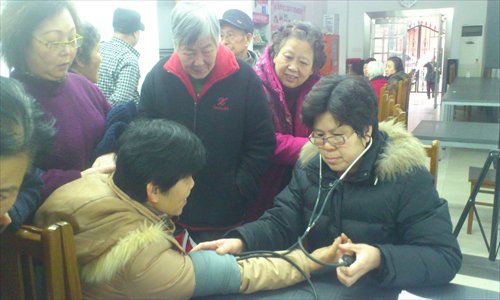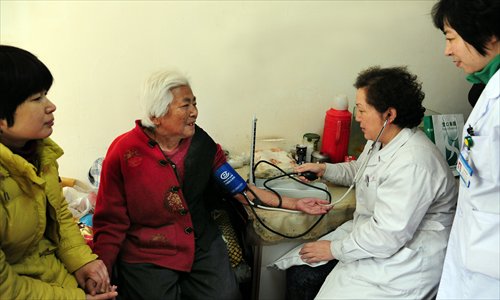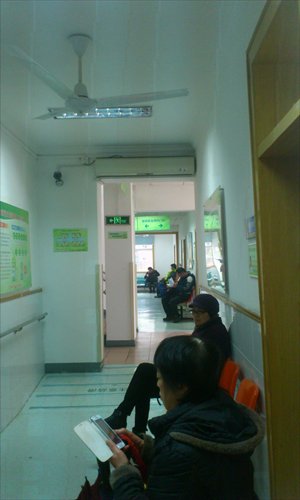Finding a cure

In many Western countries people enjoy the personal treatment of a family doctor. For just about all illnesses or health problems they initially consult family doctors, trained general practitioners (GPs) who can diagnose and treat patients or refer them to specialists if the problems need specialist intervention.
For many, the personalized family doctor is the face of medical practice and doctors and patients get to know each other over the years.
In China people seeking immediate medical treatment go to a hospital where they will be seen by one of a battery of doctors but rarely will they encounter the same doctor again and there is not the same sense of personal interaction. However this could be changing.
In 2011, China's State Council released recommendations for the establishment of a family doctor system. In Shanghai a trial project was introduced in 2000 with specialized training for GPs at Zhongshan Hospital which is affiliated with Fudan University. But the family doctor scheme, although a boon to some, has encountered problems.
Surprising contacts
At the age of 71 Shen Lingling doesn't do business or have a lot of social activities but she keeps two business cards about her all the time. The cards belong to Chen Jian, a family doctor, and Lou Huiping, a nurse, both from the Jiangsu Road Community Health Center. The cards list their office and cellphone numbers.
"We were really surprised - we never thought that doctors would give us their private contact numbers and encourage us to call them if we had health problems," Shen said.
Shen told the Global Times that many of the older residents at the Changxin neighborhood had the doctor's and nurse's business cards. The residents of the neighborhood have begun to accept that this doctor and nurse are there to help. They work from a center two blocks away from the Changxin neighborhood but every Wednesday morning, Chen and Lou come to the seniors' activity room at the neighborhood center to consult.
When the Global Times came to the room with Shen on a Wednesday morning it was obvious the doctor and nurse were popular. Although they officially begin their consultations at 9 am, by 8:45 am dozens of people had already started to queue there.
When nurse Lou arrived she began taking blood pressures and testing for blood sugar - she seemed to know everyone there and checked that they were taking their prescribed medicines.
Lou said that even though she sometimes gets calls after work from some of the elderly patients, this did not bother her - in fact she felt rewarded by this. "If we are the first people they think of when they have a health problem, it proves this is good work."
Shen has had several free consultations with the center and she knows that some of her friends who are bedridden are visited regularly by the doctor.
Chinese hospitals are ranked in three levels with community health centers regarded as tier one institutions, district hospitals tier two and teaching hospitals tier three.
Changxin is one of 13 neighborhoods in the Jiangsu Road subdistrict, a community of 51,883 residents and 18,383 families spread over 1.52 square kilometers and served by the Jiangsu Road Community Health Center.
The center has established 12 doctor and nurse teams to cover its 13 neighborhoods (one team covers two smaller sectors). To date 11,444 families (21,529 people) have registered with the center, 62.25 percent of the community.

Patient-centered
Chen Jian graduated from the Shanghai Jiao Tong University School of Medicine in 2004 and then undertook the GP course at Zhongshan Hospital. In June 2007 he started working at the Jiangsu Road center. Since 2008 he has been a family doctor there.
"The specialists at normal hospitals are disease-centered, while the GPs and family doctors who work at community medical service centers like us are patient-centered," Chen said.
Unlike the detached relationship between hospital doctors and their patients - they may never remember each other's names after a three-minute consultation - family doctors are much closer to their patients. "We have contracts with our residents and have opened a health file for everyone. We are responsible for the preventive healthcare and maintenance of the residents."
Chen sees up to 80 patients every day. On Wednesday mornings he goes to the room at the Changxin neighborhood where he and nurse Lou can see as many as 100 people during the day.
Chen explained that every Shanghai community health center had a fast channel capability so that they could send patients with serious or complicated problems directly for treatment at tier two or three hospitals. Patients with these referrals do not need to join the usual queues but are seen by specialists quickly. After treatment, when these patients return to the center, the family doctors keep a check on their recuperation.
Economic advantage
Chen thinks family doctors not only look after the health of the residents but help keep the costs down. "As we know the medical history and family history of our patients we can diagnose some conditions a lot better. Sometimes when an old man complains about dizziness it might not be a physical illness - he might just be depressed. If this is the case we give him psychological advice. If he goes to a big hospital and talks to a doctor who doesn't know him he might be given a CT scan which is really unnecessary."
The costs of seeing a doctor or buying medicines at community centers are considerably less than at big city hospitals. Drugs sold at tier two or three hospitals can be marked up by 15 percent on their wholesale prices but drugs sold by community centers must be sold at the wholesale price. "Finasteride, a medicine used to treat prostate conditions, costs 59 yuan ($9.74) at our center but usually costs more than 70 yuan at bigger hospitals," Chen said.
Xu Jianguang is the director of the Shanghai Municipal Commission of Health and Family Planning and said, "588,000 Shanghai residents have now registered with family doctors, some 32 percent of Shanghai's permanent residents. By 2020 everyone in Shanghai will have their own family doctor."
At present there are 3,200 trained GPs in Shanghai, working in 1,310 medical teams, serving 180 community health centers.
However, there are problems. Because older patients tend to suffer from chronic diseases these are the only complaints many family doctors encounter in practise.
Zhu Shanzhu is the chairman of the Society of General Practice, Chinese Medical Association and the dean of the Department of General Practice at the Shanghai Medical College at Fudan University. She told the Global Times that Shanghai was entering an aging society, so while community health centers were important, the way they were working at present was problematic.
"Theoretically, all common illnesses can be handled by a family doctor. But our community centers don't even treat patients with a high temperature - since the SARS outbreak in 2003 patients with high temperatures are automatically sent to special clinics in the major hospitals.
"Why would residents want to register with a family doctor? Because they want to have good medical treatment on hand when they need it. But why would a young person choose a family doctor knowing that he or she cannot deal with simple everyday complaints?"
Zhu is responsible for the three-year standard GPs' training at Zhongshan Hospital, and said the family doctors being trained gained experience in different departments during the training. However, working in community centers means they can lose touch with the wider variety of illnesses encountered in major hospitals.

An all-rounder
"A real GP is an encyclopedic talent - he may not have the profound knowledge and skill of a specialist but he is an all-rounder and that's the reason family doctors should be GPs so they can deal with any health problems that arise."
Zhu said if the GP system works well, then most of the patients queuing in the major hospitals in the city could be shunted to community centers and the teaching hospitals would only have to cater for difficult and complicated cases. "This would make the best use of both."
Zhu said this could also alleviate the disputes between patients and doctors.
She believes that an outpatient consultation should last 15 minutes which would mean a doctor could see about 30 patients a day. But at the centers this is not always needed or necessary. "Some of the people just come to get repeat prescriptions - the centers should change the way they work so that there is a service to provide repeat prescriptions which would allow patients with serious problems more time with the doctors."
Zhu said it has become more difficult to persuade graduates to take up general practise because of the disparity in pay rates between specialists and GPs and fewer career opportunities.
In a pilot project, Changning district had started to encourage family doctors by increasing their incomes. Once a doctor registers a patient, he will be given 10 yuan a month from the district's health budget - one family doctor could register over 2,000 people and earn more than 20,000 yuan a month above his regular salary. "The concept of a family doctor is someone who works for the good of the family and the community. A good family doctor should be able to analyze and work with the authorities to solve problems such as pollution or ventilation. That is what a family doctor could do but we have a long way to go yet," Zhu said.